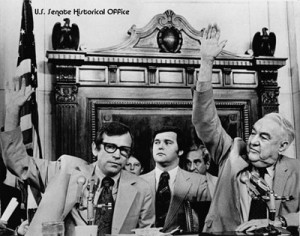Project Showcase: "Inside a Senate Investigation: Watergate 40 Years Later"
08 May 2013 – editors

Senators Howard Baker (R-TN) and Sam Ervin (D-NC) cast votes during the Senate Watergate Committee hearings of 1973. Seated behind the senators is the committee deputy counsel Rufus Edmisten, whose oral history interview is included in the collection of the U.S. Senate Historical Office. (Photo courtesy Senate Historical Office.)
During the month of May 2013, on www.senate.gov, the U.S. Senate Historical Office looks back 40 years to one of the Senate’s most important investigations. The Select Committee on Presidential Campaign Activities, more commonly known as the Watergate Committee, questioned the president’s closest advisors about the break-in and cover-up at the Watergate office complex and other “illegal and improper campaign practices” that occurred during the presidential campaign of 1972.
Hearings began in closed session on March 28, 1973, and then continued in open, televised sessions on May 17. Senator Sam Ervin of North Carolina chaired the committee, with Tennessee’s Howard Baker serving as vice-chair, ably assisted by their majority and minority counsels, Sam Dash and Fred Thompson.
Under the guidance of Senators Ervin and Baker, and backed by bipartisan support of the Senate, the Watergate Committee produced much of the evidence that led to the August 1974 resignation of President Richard Nixon. The Watergate Committee also established an important legislative legacy.
As the Watergate Committee continued its work, the Senate Committee on Rules and Administration prepared for an anticipated impeachment trial. Assisted by long-time Senate parliamentarian Floyd Riddick, the Rules Committee held its own set of executive session hearings to lay the groundwork for a presidential impeachment trial.
Since its first inquiry in 1792, Congress has conducted hundreds of investigations, fulfilling a constitutional oversight responsibility while serving as the eyes and ears of the American public. During the Civil War, Congress created the Joint Committee on the Conduct of the War to oversee wartime activities of the Lincoln administration. Throughout its history the Senate has investigated a wide array of issues, including organized crime, the defense industry, and Wall Street banking practices, revealing some of its most interesting stories and personalities, but few investigations have proved to be as consequential as Watergate. For further information, contact [email protected].
~ Betty Koed, Associate Historian, United States Senate




This excellent feature offers a timely reminder of the golden age of Senate investigations. In times of early twenty-first century investigative need, senators are quick to look back to the landmark Senate investigations of the twentieth century. The Truman Committee (1941-44) is fondly recalled as a model for scrutinizing the rampant corruption, fraud, and mismanagement revealed during the nation’s extended military operations in Iraq and Afghanistan. To explore the financial meltdown of 2008, senators suggested a committee along the lines of the early 1930s Pecora Committee on the Stock Market Crash. But times have changed. Aside from crippling partisanship, a major barrier to creating such a panel composed entirely of senators is the enormous commitment of time and talent necessary to master the complex issues involved. Senators of the current era are simply too busy and too distracted to actively participate in investigations that could extend for years. Consequently, the latter-day Pecora Committee became the Financial Crisis Inquiry Commission. That panel included no incumbent member of the Senate or House. Therefore, it—and similarly constituted outside commissions—lacked advocates whose investment in the issues under study would motivate them to follow up as sponsors of legislative remedies, with the persistence and congressional tenure to ensure that recommendations remained before Congress for action rather than on a library shelf. If the Senate and House pursue this pattern into the twenty-first century, they will be abdicating the fundamental constitutional right—under the doctrine of separation of powers–of the Senate and House to hold the executive branch accountable. That would be an incalculable loss of “the most necessary of all powers.”
Richard A. Baker, US Senate Historian Emeritus